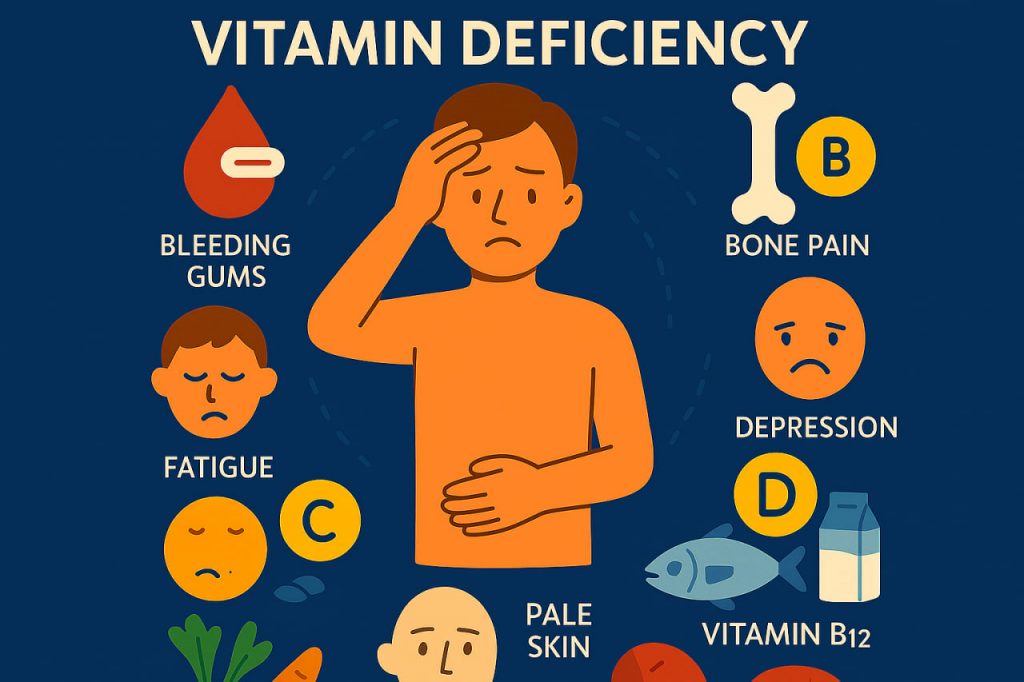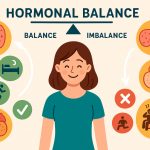Vitamins are essential nutrients that your body needs in small amounts to function properly. When you don’t get enough of one or more vitamins—either from your diet or due to absorption issues—you may begin to experience vitamin deficiency. Early symptoms can be subtle but may lead to serious health problems if ignored.
Why Vitamin Deficiencies Happen
Deficiencies can be caused by:
- Poor or unbalanced diet
- Chronic diseases (like digestive or liver disorders)
- Alcohol or drug abuse
- Pregnancy or breastfeeding
- Aging
- Certain medications
- Vegan or restrictive diets without supplementation
Understanding the symptoms of different deficiencies can help detect and treat them early.
Common Vitamin Deficiencies and Their Symptoms
1. Vitamin D (Sunshine Vitamin)
Function: Supports bones, immunity, and mood
Deficiency Signs:
- Frequent infections
- Fatigue and weakness
- Bone or back pain
- Depression
- Slow wound healing
2. Vitamin B12
Function: Nerve function, red blood cell production
Deficiency Signs:
- Fatigue
- Numbness or tingling in hands/feet
- Memory problems
- Pale skin
- Mood swings or depression
3. Vitamin C
Function: Collagen production, immunity, iron absorption
Deficiency Signs:
- Bleeding gums
- Slow healing wounds
- Easy bruising
- Dry skin
- Frequent colds
4. Vitamin A
Function: Vision, immune health, skin repair
Deficiency Signs:
- Night blindness
- Dry eyes or skin
- Frequent infections
- Acne or rough skin texture
5. Vitamin B1 (Thiamine)
Function: Nervous system and energy metabolism
Deficiency Signs:
- Irritability
- Poor memory or confusion
- Muscle weakness
- Loss of appetite
6. Vitamin E
Function: Antioxidant protection, skin and eye health
Deficiency Signs:
- Muscle weakness
- Coordination problems
- Vision issues
- Weak immune response
7. Vitamin K
Function: Blood clotting and bone health
Deficiency Signs:
- Easy bruising
- Excessive bleeding from cuts or nose
- Heavy menstruation
When to Seek Help
If you experience persistent, unexplained symptoms, see a healthcare provider. A simple blood test can detect most vitamin deficiencies. Treatment usually includes:
- Dietary changes
- Supplements (under supervision)
- Treating the underlying cause (e.g., digestive issues)
Preventing Vitamin Deficiency
- Eat a diverse, whole-foods-based diet: fruits, vegetables, grains, lean proteins, dairy, and healthy fats
- Get regular sunlight for vitamin D
- Limit processed foods, which are low in nutrients
- Stay hydrated, as water helps absorb and transport vitamins
Conclusion
Vitamin deficiencies are more common than many realize. By paying attention to your body’s signals and supporting it with a nutrient-rich diet, you can prevent deficiencies and stay energized, resilient, and healthy.
Glossary
- Micronutrient: A nutrient needed in small amounts for proper function
- Absorption: The process of taking nutrients from food into the bloodstream
- Night Blindness: Difficulty seeing in low light, often linked to low vitamin A
- Antioxidant: A substance that protects cells from damage


